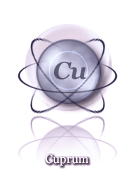Copper supplement

Copper is essential for prevention from various cardiovascular diseases, healthy skin and hair, and fertility. Copper is contained in 15 types of proteins. Many people suffer from light insufficiency of this mineral. Even though copper is contained in number of food, its intake is low.
Copper – utilization
Copper is an essential microelement for blood vessels, bones and nerves. It regulates the process of fertility, growth of nails and hair, and blood coagulation. This mineral is available in several forms of dietary supplements such as citrate and aspartate.
Prevention: According to some studies, copper is effective in prevention from high blood pressure and cardiac disorders. Some scientists assume, copper suppresses free radicals and thereby prevent from various heart disorders and cancer. Sufficiency of copper helps to lower the level of cholesterol in blood. Copper also partakes in production of one of the most important antioxidant in human organism SOD (superoxide dismutase).
Copper – benefits and effectiveness
Copper is fundamental for production of collagen; basic protein in bones, skin and connective tissue. It plays a key role in erythrocytes production, helps the organism to absorb ferrum properly, and strengthens the immunity system and fertility. Copper regulates proper pigmentation of hair, skin and eyes. Copper might be effective in prevention from high blood pressure and irregular palpitation. This mineral protects cells from free radicals and from bone marrow loss resulting from osteoporosis.
Copper insufficiency: Copper deficiency usually occurs with some disease such as Crohn’s or celiac disease. The symptoms of this mineral deficiency are fatigue, palpitation failure, hair rarefaction, high blood pressure, impotence, or anemia.
Copper surplus: Even the dose of 10 mg in single intake might evoke sickness, stomachache, or muscular tension. However, serious intoxication resulting from oral usage of copper was not identified. Only people working with pesticides and using copper experienced liver failure, coma or even death.
Copper – recommended dosage
The exact daily dosage has not yet been specified. However, it is recommended to use 1,5 to 3 mg of copper as a prevention from the mineral deficiency and protection from various illnesses resulting from improper organism functioning.
Copper – usage suggestions
It is recommended to keep the dosage in proper rate (3 mg per day) and do not increase the doses neither in food nor in dietary supplements. If one uses zinc dietary supplements more than a month, he should add 2 mg of copper to the therapy. People using antacids regularly should also use copper dietary supplements.
It is recommended to use copper in the same day time with a meal to prevent possible stomach irritation or sickness.
Copper – resources
Some of the copper sources are beans, livers, whole seeds, or nuts. The main sources are lobsters, oysters, crabs and entrails. In vegetarian food is copper contained in legumes, soya, dark bread, peas, artichokes, avocado, garlic, mushrooms, potatoes or tomatoes. Fruits most rich in copper are bananas and plums.
Copper - warnings
In health food stores, there are no copper dietary supplements available. Usually, copper is combined with zinc. It is important to balance the usage of copper, if one uses zinc more than two months. Zinc might suppress the organism ability to absorb copper. If one experiences any health difficulties, he should consult using dietary supplements with his physician.
Copper – additional information
- One avocado of an average size contains the same amount as one sixth of recommended daily dosage of copper.
- According to new research, copper is effective in prevention from osteoporosis. Women between the age of 45 and 56 who used 3 mg of copper every day had reduced bone marrow loss.